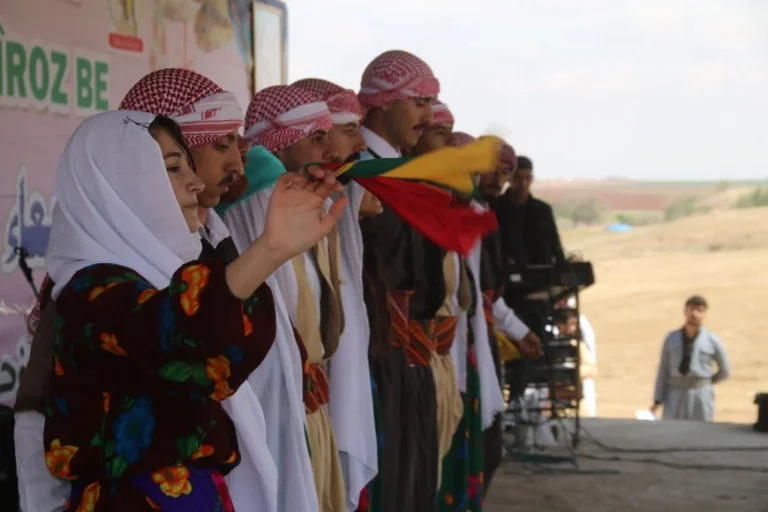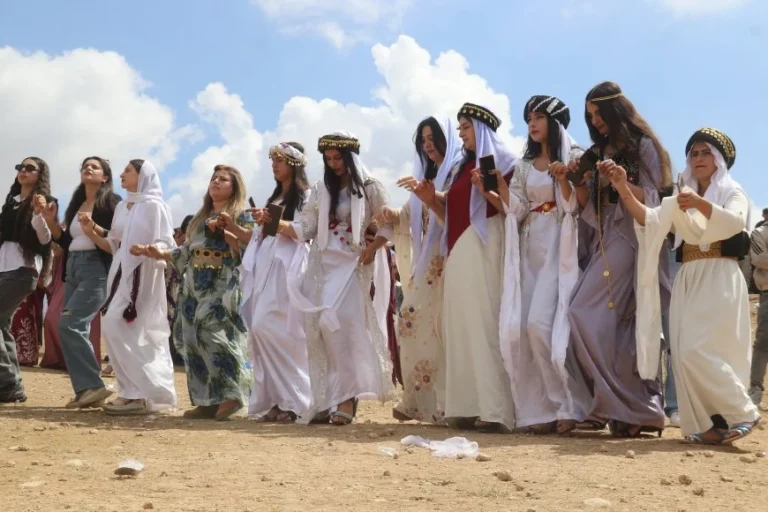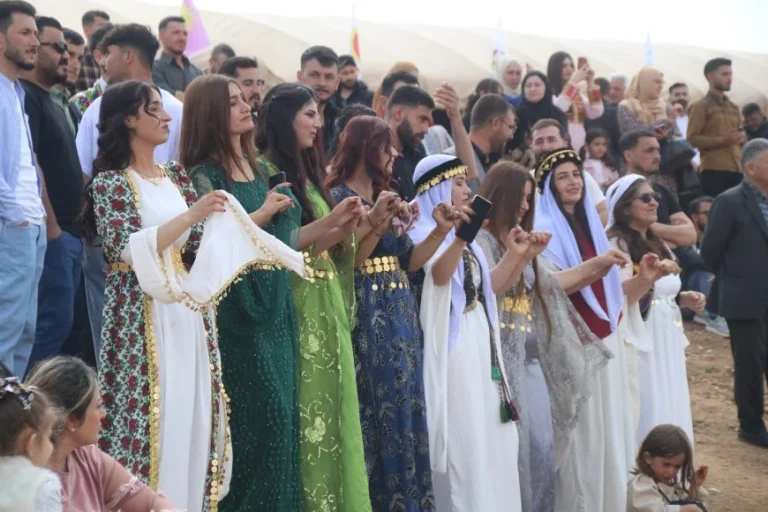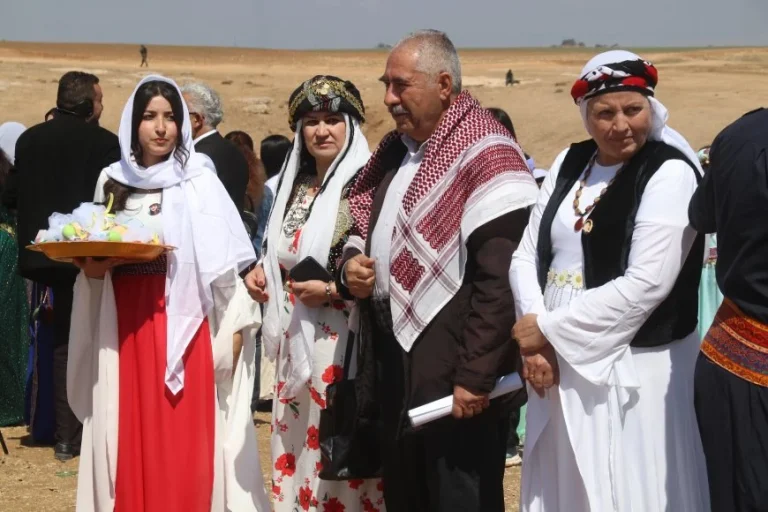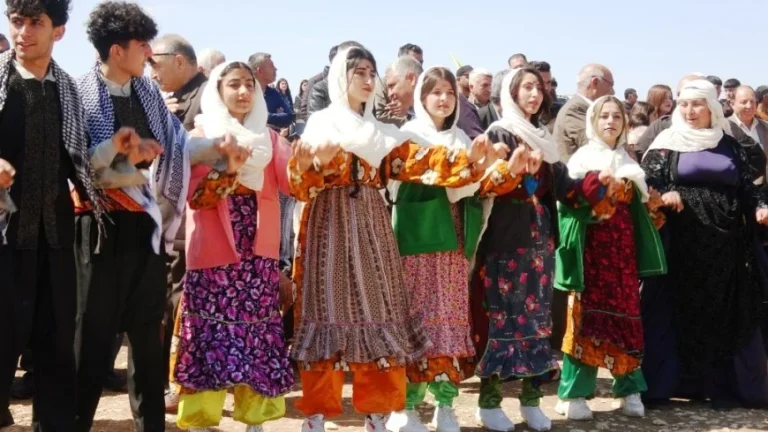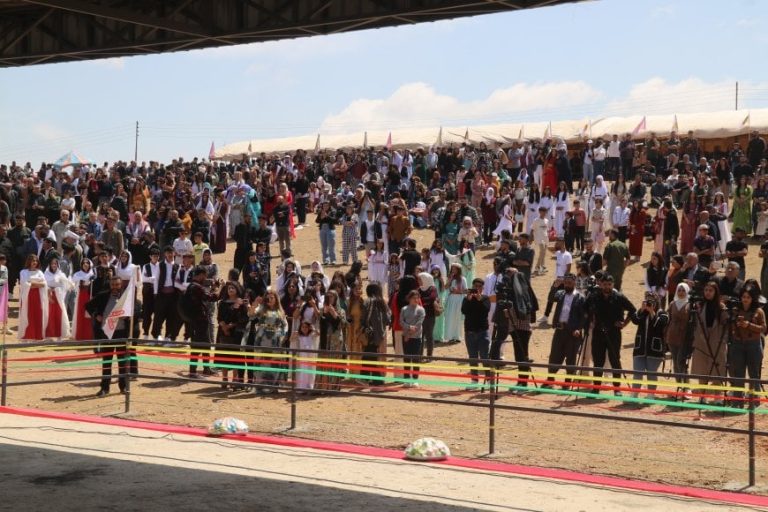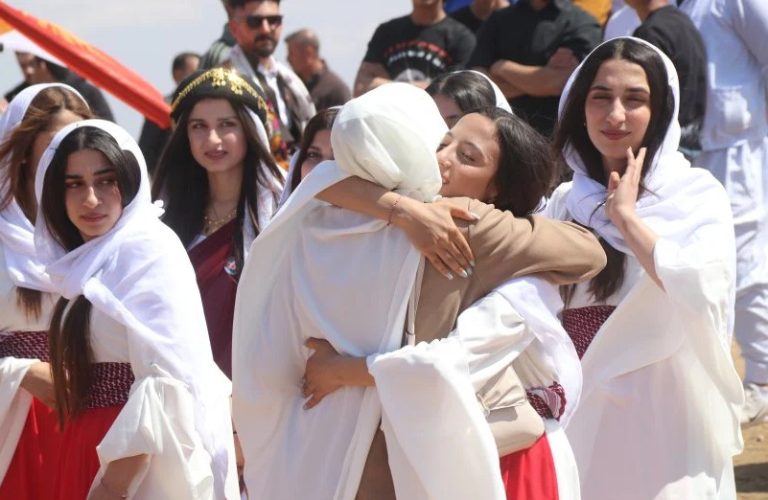The freedom of the Yazidis is intertwined with the freedom of the peoples of the Middle East.
(Abdullah Ocalan)
For a long time, Yazidi women were in the media spotlight around the world because of the treatment they suffered at the hands of ISIS, who sold them as slaves. Rape was once again used against them as a weapon of war and before being sold, those who were pregnant were subjected to forced abortions. These were women displayed in the markets of Raqqa and Mosul, with a price on their bodies—treated as goods passed from one man to another. This caused profound individual and collective trauma. It is as victims of these crimes that Yazidi women are known—but they, and their people, are more than this.
The Yazidi people are one of the oldest peoples of Mesopotamia, practicing a faith that shares its origins with Zoroastrianism. In the morning, they pray to the rising sun to protect all the peoples of the world. The religion worships a single God, while also preserving a culture of Goddesses that is still alive today, as seen in the Peacock Angel, who is believed to have created the world.
Yazidis speak Kurmanji Kurdish and are one of the many vibrant facets of the Kurdish people. They are found throughout Kurdistan, but today are primarily concentrated in the region of Shengal, near Mount Sinjar, and in Shekhan—both located in Iraqi Kurdistan. Especially after genocides such as the one on Shengal in 2014 by ISIS, and more then 73 (that are counted) others that came before it, many Yazidi have been forced to migrate to other areas.
Within Yazidi culture, and in all the Kurdish culture, women have traditionally held an important role. The special thing about Ezidi people is that they have been able to protect their culture until today, so that in some regions women still hold authority inside the society and the family. For example they were able to defend a Middle-Eastern tradition in which a woman can stop conflicts simply by throwing their veil to the ground.
The Yazidi people have been the constant target of attacks—even before the rise of ISIS. Still today, after reclaiming their right to self-determination, they continue to be attacked by states (including the Iraqi state) and by those who reject pluralism and the idea of self-governance. But today, what is unfolding in North and East Syria is a different story—a story in which all cultures and religions have a space, including the Yazidi faith. The Yazidi New Year, known as Red Wednesday, fell on April 16 this year.
Red Wednesday was celebrated in several cities across North and East Syria, as well as in Shengal. Stages were set up, speeches were given highlighting the importance of Yazidi culture and the brotherhood among peoples. There was theater, music, and dancing, and hundreds of people took part—Yazidis, Muslims, Christians. This is just one of many moments that once again reveal the strength of Yazidi culture. The Yazidi people have organized themselves according to the principles of the democratic nation, establishing communes, committees, and assemblies. In the Shengal region, they have even formed their own defense forces (YBŞ), including autonomous women’s units (YJŞ).
Red Wednesday is the most important celebration in Yazidi culture—an ancient festival that has been observed for thousands of years. Like many Yazidi holidays, it is deeply connected to nature: it marks the arrival of spring and the anniversary of the creation of the universe. Eggs are boiled and dyed to symbolize the rebirth of the universe. Just as the world transformed from a state of liquid lava into solid earth, the hardening of the egg represents the solidification of the world.
At sunrise, the day begins with prayers for all of humanity. Food and sweets are prepared to welcome guests. According to Yazidi belief, since the world was created in spring, flowers are gathered and placed at the entrance of the home alongside the colored eggs—they are meant to protect the household. Those who are in mourning visit the cemetery and share food there. Work is not done on this day, and because of its sacred significance, no weddings are held throughout the month of April: it is said that “April does not accept brides”.
In relation to the call for peace and a democratic society, the leader of Democratic Confederalism, Abdullah Öcalan, wrote a letter specifically addressed to the Yazidi people, in which, among other things, he wrote: “The Yazidis are among the oldest faith communities and the most ancient societies in Mesopotamia. They have paid a great price to preserve their culture, identity, and existence. The tragedies they have endured are etched not only in the collective memory of the Yazidi people but also in the shared conscience of humanity. […] The Yazidis must become an active force in the struggle for democratization and the construction of a democratic society based on free and communal living. Any approach that does not recognize the freedom of the Yazidi people or disregards their existence is illegitimate. Our Yazidi people must organize themselves in every sphere they are in and secure their future. The struggle for a democratic, free, and equal life is the shared responsibility of all our peoples. […]”
On the 4th of April, the birthday of Abdullah Ocalan, the YJŞ, the women units of Şengal, wrote: “As a people whose national identity was denied, whose language was forbidden, whose culture faced assimilation, and whose historical values were threatened with erasure, we found new life through Leader Apo’s philosophy. A hope for constructing a free and dignified life was born. Therefore, we accept his ideas as guiding principles and continue our struggle for the freedom of our society. […] the struggle for women’s freedom and the liberation of peoples has now turned into a universal vanguard movement. For this reason, we, as women, young people, and our people, embrace Leader Apo with great belief and commitment. We will achieve a free life under the light of his ideas. At every stage of our struggle, we will continue on our path, guided by his thoughts.”
The resistance of the Yazidi people has not ended. Today, in the face of centralism and the lack of democracy under the HTŞ government in Damascus, their resistance and self-organization becomes even more vital. It is important not only because it stands as the most powerful form of revenge for the women who were sold and raped, but also because it represents the most effective form of self-defense against massacres—like the recent massacres carried out against the Alevi people. Democratic Confederalism also serves as a way to prevent future massacres ensuring that such atrocities, like the Yazidi genocide that took place in 2014, are never repeated—neither against the Yazidi or Alevi people nor against any other community.
